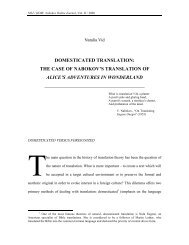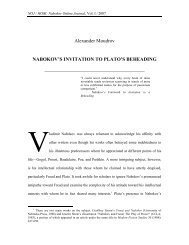Create successful ePaper yourself
Turn your PDF publications into a flip-book with our unique Google optimized e-Paper software.
Nabokov Online Journal, Vol. V (2011)<br />
_______________________________________________________________________<br />
resurrection. In response to John Ray’s explanation as to why he and her stepfather had<br />
her declared dead in their version – “It was my suggestion,” says Ray. “[R]eaders like<br />
stories with a moral.” – Lo retorts: “You mean those in which the characters can’t have<br />
other stories?” (Lo’s Diary 4). Allowing Lo to live and persevere, the author obviates the<br />
very idea of aesthetic immortalization, implicitly rejecting Humbert’s claim to any<br />
justification for his writing that is not completely self-serving. 18 If Lolita can survive<br />
without anyone’s help, then why does one need art at all?<br />
2) By turning over the narrator’s role to a teen-age girl, an angry and coarse-<br />
spoken one intent on “telling it like it is,” Pera removes the layer of literariness and style<br />
that is supposed to redeem this story otherwise interpretable as obscene; thus, after all,<br />
was Nabokov’s book originally received by inattentive and conservative readers, who<br />
were interested not in the position of the author or the redeeming quality of the novel’s<br />
language, but only in the obvious fact of its obscene topic. Nabokov, who held obscene<br />
language to be in bad taste, clothes his obscene subject in the heavy drapery of literary<br />
stylization, layers of metaphor and image, pathos, tragedy (“The tragic and the obscene<br />
exclude each other,” he asserts [Selected Letters 184]), and finally various dimensions of<br />
parody. For her part, Pera deplores pretensions to good taste that obscure the obscene,<br />
instead purposefully affirming it; she exposes Lolita “in a naked light” in all her vulgarity<br />
and the affair in all its sordidness. No details are spared.<br />
According to Baudrillard, obscenity is a postmodern condition commencing<br />
“when there is no more spectacle, no more stage, no more theater, no more illusion, when<br />
everything becomes immediately transparent, visible, exposed in the raw and inexorable<br />
light of information and communication” (21). This complete access to information is<br />
what Nabokov’s text denies: Lolita remains a shimmering, enigmatic, unattainable image<br />
that can never be fully possessed or apprehended. Pera’s revision, by contrast, renders<br />
both text and heroine infinitely accessible. This absence of mystery, moreover,<br />
constitutes an ideological stance; denuding and availability are not shortcomings but<br />
principles of Pera’s work.<br />
18 Incidentally, in Pera’s rendition, the incestuous stepfather also survives unchanged in his pursuit of<br />
forbidden pleasures, a fact beclouding any possible instantiation on his part of transformation-throughmemoir-writing,<br />
and rendering the question of life through art, in his case, not so pressing a concern.<br />
14

















